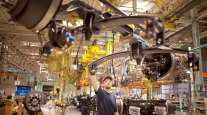Trailer Orders Double in June, Led by Demand for Dry Vans
This story appears in the Aug. 2 print edition of Transport Topics.
New orders for commercial trailers, led by dry van orders, more than doubled in June, surging 103% over the same month last year, ACT Research Co. reported.
ACT, Columbus, Ind., did not report the number of June orders in its July 22 statement, but in May said that about 6,000 new trailers were ordered during June 2009 (click here for previous story).
Earlier this month, ACT also reported that orders for new Class 8 trucks had risen 93% in June, for 15,999 vehicles (click here for previous story).
Through June, year-to-date orders for trailers were up 74%, ACT said. Year-to-date dry van orders were up 164%. Orders for new refrigerated vans were up 5% on a year-to-date basis, ACT reported,
“We kind of mirror what ACT is saying on the dry van market,” Chris Hammond, vice president of dealer sales for Great Dane Trailers, told Transport Topics. “We’re seeing a very nice increase.”
Great Dane, which has headquarters in Chicago and Savannah, Ga., has seven manufacturing plants in the United States.
“We are increasing production to meet this dry van demand, but the reefer market has been inconsistent,” Hammond added.
“I would think that data is pretty accurate,” Glenn Harney, chief operating officer of Hyundai Translead, told TT. “Just about every month this year has been better than last year.”
Hyundai Translead, which manufactures dry vans, reefers and container chassis, has added 600 workers to its factory this year, half of them permanent and half temporary employees who could become permanent if the upturn continues, Harney said.
Hyundai Translead, San Diego, has a factory in Tijuana, Mexico, and is a subsidiary of Korea-based Hyundai Motors Co.
“Our June was a very good month, and we’ve been up generally this year, though that was over a very poor 2009,” Craig Bennett, senior vice president of sales and marketing, Utility Trailer Manufacturing Co., City of Industry, Calif., told TT.
“One thing that is nice about the increase in trailer orders is that most of the orders are for near-term production, meaning they will get built and will boost the industry immediately,” Eric Starks, president of transportation research firm FTR Associates Inc., based in Nashville, Ind., told TT.
“One problem is that this will probably put a lot of pressure on the supplier industry, a lot of which downsized during the recession,” Starks added. “Both the trailer makers and their suppliers are facing the same decisions: Do I add employees or not and permanently raise my costs, and will the second half of the year be as strong?”
Hyundai Translead’s Harney agreed about the supplier market.
“We haven’t had too much trouble getting our factory ramped up, because it’s still not at peak, by any means,” Harney said. “The bigger challenge is the component suppliers, because many have not gotten their production up quite so fast.”
Tim Musgrave, president and CEO of Pressure Systems International, which supplies automatic tire-inflation systems to manufacturers of trucks and trailers, said that he prepared his company for the upturn.
“At the end of last year and the beginning of this year, I asked for and received permission from our board to build up our inventory, even though we didn’t have orders for it,” Musgrave told TT.
“It’s just holding onto our cash in a different way, because capital was bringing in less than 1% interest anyway,” he added. “Plus, the worst thing I ever had to do in my life was lay off people in the last recession. This time, we kept them working, and we didn’t have to let any go and we were ready to go when orders picked up.”
He said the preparation paid off for P.S.I., which is based in San Antonio.
“Our business through June of this year is equal to all that we had during the entire year of 2009,” Musgrave said. “In June itself, we were up 118% over June of last year.”
Hammond said Great Dane was adding shifts and calling back laid-off workers at all seven of its factories, but he did not have exact numbers.
He said he was optimistic because all sizes of fleets were ordering trailers.
“The rebound has spread so that we’re not relying on just big orders but also from what we call ‘retail orders,’ in lots of 50 trailers and even 20 or 10,” Hammond said.
Utility Trailer’s Bennett said that the company was having trouble rehiring the trained workers it had laid off during the recession and had to hire “untrained people with very few skills, so that it takes longer to get production back up.”
“July orders have not been as strong as June,” he added. “It’s partially the summer slowdown, but partially the fact that freight tonnage has moderated a little bit.”
He said Utility was still positive about market growth.
“We’re optimistic that things will continue to improve slowly over the year, but not in the 100% range,” Bennett said. “We think we’ll be up 25% this year and, hopefully, the same in 2011.”


